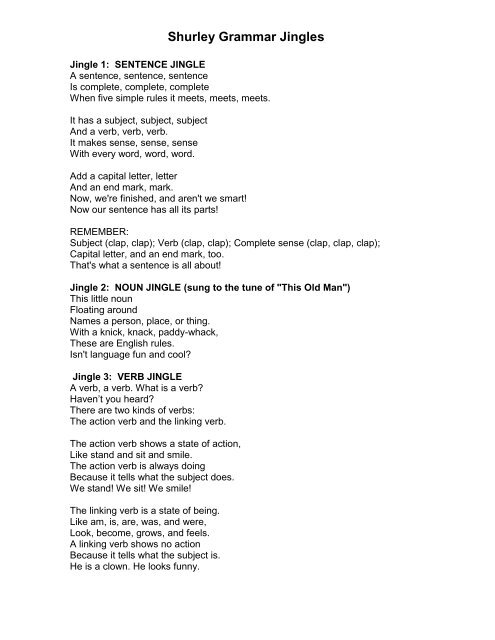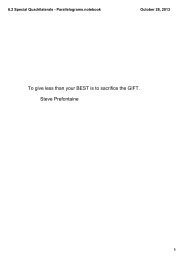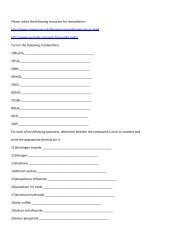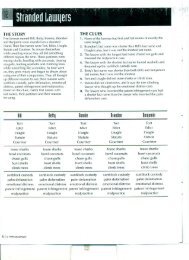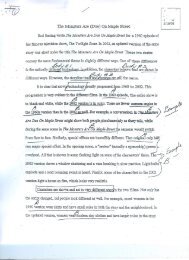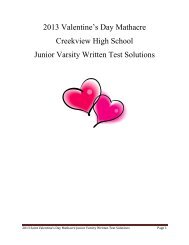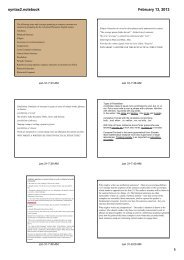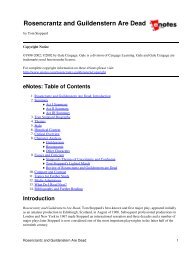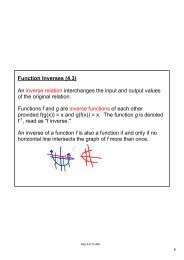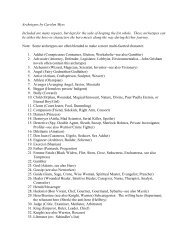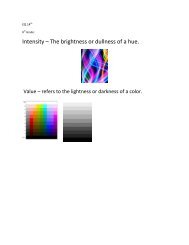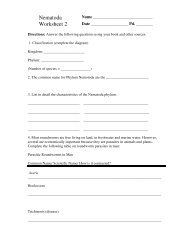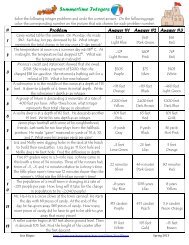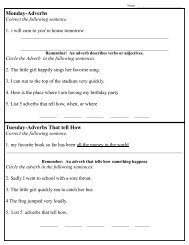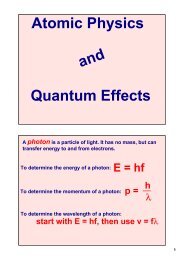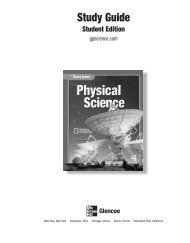Shurley Grammar Jingles – 4th Grade
Shurley Grammar Jingles – 4th Grade
Shurley Grammar Jingles – 4th Grade
Create successful ePaper yourself
Turn your PDF publications into a flip-book with our unique Google optimized e-Paper software.
<strong>Shurley</strong> <strong>Grammar</strong> <strong>Jingles</strong><br />
Jingle 1: SENTENCE JINGLE<br />
A sentence, sentence, sentence<br />
Is complete, complete, complete<br />
When five simple rules it meets, meets, meets.<br />
It has a subject, subject, subject<br />
And a verb, verb, verb.<br />
It makes sense, sense, sense<br />
With every word, word, word.<br />
Add a capital letter, letter<br />
And an end mark, mark.<br />
Now, we're finished, and aren't we smart!<br />
Now our sentence has all its parts!<br />
REMEMBER:<br />
Subject (clap, clap); Verb (clap, clap); Complete sense (clap, clap, clap);<br />
Capital letter, and an end mark, too.<br />
That's what a sentence is all about!<br />
Jingle 2: NOUN JINGLE (sung to the tune of "This Old Man")<br />
This little noun<br />
Floating around<br />
Names a person, place, or thing.<br />
With a knick, knack, paddy-whack,<br />
These are English rules.<br />
Isn't language fun and cool?<br />
Jingle 3: VERB JINGLE<br />
A verb, a verb. What is a verb?<br />
Haven’t you heard?<br />
There are two kinds of verbs:<br />
The action verb and the linking verb.<br />
The action verb shows a state of action,<br />
Like stand and sit and smile.<br />
The action verb is always doing<br />
Because it tells what the subject does.<br />
We stand! We sit! We smile!<br />
The linking verb is a state of being.<br />
Like am, is, are, was, and were,<br />
Look, become, grows, and feels.<br />
A linking verb shows no action<br />
Because it tells what the subject is.<br />
He is a clown. He looks funny.
Jingle 4: ADVERB JINGLE<br />
An adverb modifies a verb, adjective, or another adverb.<br />
An adverb asks, "How? When? Where?"<br />
To find an adverb, GO, ASK, GET.<br />
Where do I GO? To a verb, adjective, or another adverb.<br />
What do I ASK? How? When? Where?<br />
What do I GET? An adverb! (clap) That's what!<br />
Jingle 5: ADJECTIVE JINGLE<br />
An adjective modifies a noun or a pronoun.<br />
An adjective asks, "What kind? Which one? How many?"<br />
To find an adjective, GO, ASK, GET.<br />
Where do I GO? To the noun or the pronoun.<br />
What do I ASK? What kind? Which one? How many?<br />
What do I get? An adjective! (clap) That's what!<br />
ARTICLE ADJECTIVE JINGLE<br />
We are the article adjectives!<br />
Teeny, tiny adjectives!<br />
A, AN, THE<br />
A, AN, THE<br />
We are called article adjectives and noun markers.<br />
We are memorized and used every day.<br />
So if you spot us, you can mark us<br />
With the label "A".<br />
We are the article adjectives!<br />
Teeny, tiny adjectives!<br />
A, AN, THE<br />
A, AN, THE<br />
Jingle 6: THE PREPOSITION JINGLE<br />
A PREP PREP PREPOSITION<br />
Is a special group of words<br />
That connects a<br />
NOUN, NOUN, NOUN<br />
Or a PRO PRO PRONOUN<br />
To the rest of the sentence.<br />
Jingle 7: OBJECT OF THE PREPOSITION JINGLE<br />
Dum De Dum Dum!<br />
An O-P is a N-O-U-N or a P-R-O<br />
After the P-R-E-P<br />
In a S-E-N-T-E-N-C-E.<br />
Dum De Dum Dum - Done!
Jingle 8: PREPOSITION FLOW (The 49 Prepositions Jingle)<br />
1. Preposition, Preposition<br />
Starting with an A.<br />
(Fast)<br />
aboard, about, above,<br />
across, after, against,<br />
(Slow)<br />
along, among, around, at.<br />
2. Preposition, Preposition<br />
Starting with a B.<br />
(Fast)<br />
before, behind, below,<br />
beneath, beside, between,<br />
(Slow)<br />
beyond, but, by.<br />
3. Preposition, Preposition<br />
Starting with a D.<br />
down (slow & long),<br />
during (snappy).<br />
4. Preposition, Preposition<br />
Don’t go away.<br />
Go to the middle<br />
And see what we say.<br />
E-F-I and L-N-O<br />
except, for, from,<br />
in, inside, into,<br />
like, near, of,<br />
off, on, out,<br />
outside, over.<br />
5. Preposition, Preposition<br />
Almost through.<br />
Start with P and end with W.<br />
past, since, through,<br />
throughout, to, toward,<br />
under, underneath,<br />
until, up, upon,<br />
with, within, without.<br />
6. Preposition, Preposition<br />
Easy as can be.<br />
We’re all finished,<br />
And aren’t you pleased?<br />
We’ve just recited<br />
All 49 of these.
Jingle 9: PRONOUN (sung to the tune of "This Old Man")<br />
This little pronoun,<br />
Floating around,<br />
Takes the place of a little old noun.<br />
With a knick knack paddy wack,<br />
These are English rules.<br />
Isn’t language fun and cool?<br />
Jingle 10: SUBJECT PRONOUN<br />
There are seven subject pronouns<br />
That are easy as can be:<br />
I and we, (clap twice)<br />
He and she, (clap twice)<br />
It and they and you. (clap three)<br />
Jingle 11: POSSESSIVE PRONOUN<br />
There are seven possessive pronouns<br />
That are easy as can be:<br />
My and our, (clap twice)<br />
His and her, (clap twice)<br />
Its and their and your. (clap three)<br />
Jingle 12: THE EIGHT PARTS OF SPEECH JINGLE<br />
Want to know how to write?<br />
Use the eight parts of speech <strong>–</strong> They’re dynamite!<br />
Nouns, Verbs, and Pronouns <strong>–</strong> They rule!<br />
They’re called the NVP’s, and they’re really cool!<br />
The Double A’s are on the move;<br />
Adjectives and Adverbs help you groove!<br />
Next come the PIC’s, and then we’re done!<br />
The PIC’s are Preposition, Interjection, and Conjunction!<br />
All together now, the eight parts of speech, abbreviations please:<br />
NVP, AA, PIC - NVP, AA, PIC!
Jingle 13:<br />
THE 23 HELPING VERBS OF THE MEAN, LEAN VERB MACHINE JINGLE<br />
These 23 helping verbs will be on my test.<br />
I gotta remember them so I can do my best.<br />
I’ll start out with 8 and finish with 15;<br />
Just call me the mean, lean verb machine.<br />
There are 8 be verbs that are easy as can be:<br />
am, is, are <strong>–</strong> was and were,<br />
am, is, are <strong>–</strong> was and were,<br />
am, is, are <strong>–</strong> was and were,<br />
All together now, the 8 be verbs:<br />
am, is, are <strong>–</strong> was and were <strong>–</strong> be, being, and been,<br />
am, is, are <strong>–</strong> was and were <strong>–</strong> be, being, and been.<br />
There’re 23 helping verbs, and I’ve recited only 8.<br />
That leaves fifteen more that I must relate:<br />
has, have, and had <strong>–</strong> do, does, and did,<br />
has, have, and had <strong>–</strong> do, does, and did,<br />
might, must, may <strong>–</strong> might, must, may.<br />
Knowing these verbs will save my grade:<br />
can and could <strong>–</strong> would and should,<br />
can and could <strong>–</strong> would and should,<br />
shall and will, - shall and will.<br />
In record time, I did this drill.<br />
I’m the mean, lean verb machine <strong>–</strong> STILL!<br />
Jingle 14: OBJECT PRONOUN JINGLE<br />
There are seven object pronouns<br />
That are easy as can be:<br />
Me and us, (clap two times)<br />
Him and her, (clap two times)<br />
It and them and you. (clap three times)<br />
Jingle 15: DIRECT OBJECT JINGLE<br />
A direct object is a noun or pronoun.<br />
A direct object completes the meaning of the sentence.<br />
A direct object is located after the verb-transitive.<br />
To find the direct object ask WHAT or WHOM after the verb.<br />
Jingle 16: INDIRECT OBJECT JINGLE<br />
An indirect object is a noun or a pronoun.<br />
An indirect object receives what the direct object names.<br />
An indirect object is located between the verb-transitive and the direct object.<br />
To find the indirect object, ask TO WHOM or FOR WHOM after the direct object.
Jingle 17A: PREDICATE NOUN JINGLE<br />
A predicate noun is a noun or a pronoun.<br />
A predicate noun means the same thing as the subject word.<br />
A predicate noun is located after a linking verb.<br />
To find the predicate noun ask WHAT or WHO after the verb.<br />
Jingle 17B: PREDICATE NOUN JINGLE<br />
Listen, my comrades, and you shall hear<br />
About predicate nouns from far and near.<br />
No one knows the time or year<br />
When the predicate nouns will appear.<br />
Listen now to all the facts,<br />
So you will know when the Pred’s are back!<br />
Dum De Dum Dum!<br />
A predicate noun is a special noun in the predicate<br />
That means the same thing as the subject word.<br />
To find a predicate noun, ask what or who<br />
After a linking verb.


